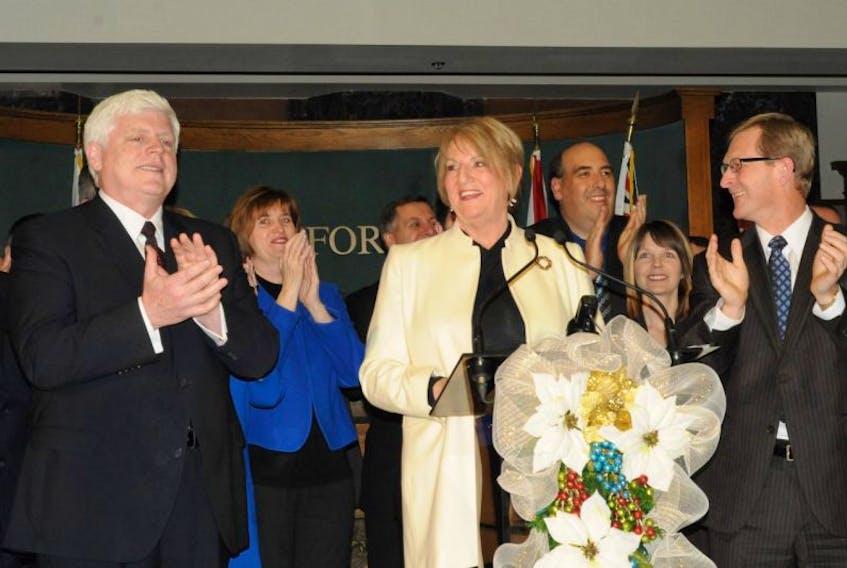“It’s so easy for propaganda to work, and dissent to be mocked.” — Harold Pinter
It appeared briefly on-screen at the Muskrat Falls inquiry in St. John’s Tuesday during testimony from four former members of Nalcor’s board of directors.

And it was only a hypothetical action plan; who knows if it was ever purposefully enacted.
I’m referring to a risk status report dated Sept. 16, 2012 that stemmed from a risk workshop attended by Muskrat Falls project higher-ups that examined hypothetical risks to the project, and possible responses.
One of the risks identified was “non-governmental organization/stakeholder protest” — which, in fact, would be borne out by literal protests at the Muskrat Falls construction site in years to follow, attempts at blockading the transport of transmission line equipment, as well as philosophical protests and criticism by concerned citizens who weren’t convinced the project was based on sound or viable assumptions.
One of the responses to that risk fell under the bailiwick of Nalcor Energy’s Dawn Dalley, then vice-president of corporate relations. Among the actions suggested should the need arise, was “Leverage Quebec versus NL debate to rally support for this venture.”
On Sept. 29, I wrote a column titled “Why governments and mega-projects should never mix,” pointing out what experts have noted: that governments are simply incapable of promoting mega-projects while keeping public interests paramount. The two roles can conflict. And by extension, neither should a Crown corporation promote a mega-project; after all, they are owned by the people and should be working in their best interests as well.
Why was Nalcor promoting the project at all, let alone considering doing so by stoking anti-Quebec sentiment that has simmered for decades?
Is that a Crown corporation’s role? Isn’t it simply supposed to communicate straight information about the project and let people decide whether they approve or not based on its merits and flaws?
Why was Nalcor promoting the project at all, let alone considering doing so by stoking anti-Quebec sentiment that has simmered for decades?
I have friends in the communications world and I know about the importance of messaging, but poking sticks in old wounds? Is that what Nalcor considered a potential part of its mandate?
Interestingly, when the four former members of Nalcor’s board of directors — Tom Clift, Ken Marshall, Gerry Shortall and Terry Styles — were questioned about the strategy at the inquiry this week, there were nods of approval and comments that Dalley would have just been doing her job had she carried out the action plan.
What’s even more interesting is that less than three weeks after this risk response plan was completed, Kathy Dunderdale did a one-eighty on her own communications strategy. She abruptly stopped selling the merits of Muskrat — the low-cost energy, the potential for sales in other marketplaces, its appeal as a power source to industry — and launched full flight into jingoism-fuelled speeches riddled with images of oppression and emancipation.
Speaking to the St. John’s Board of Trade on Oct. 3, 2012, she declared: “If Muskrat Falls does not go ahead, what happens in Labrador from that point on lies squarely in the hands of Hydro-Québec and the province of Quebec.”
“The Upper Churchill Contract remains an open wound…,” Dunderdale said.
“Escaping Quebec’s predatory grip on our province’s economy is absolutely fundamental…”
“…that stranglehold is costing us opportunities that we need to be developing right now.”
“…we will not be held hostage.”
“Escaping Quebec’s grip on our hydro sector and gaining a new revenue stream based on a truly renewable resource means true independence for Newfoundland and Labrador…”
And on and on it went. By the summer of 2013, Dunderdale was still being divisive and The Canadian Press was reporting that tensions over Muskrat Falls between Newfoundland and Labrador and Quebec had reached fever pitch.
Mission accomplished, I guess.
My point is that neither the government of the day nor Nalcor had any problem with the idea of exploiting anti-Quebec feeling among the populace to accomplish their own ends, which just happened to be one and the same: building Muskrat Falls — a mega-project so grossly over-budget as to warrant a public inquiry.
Anyone feel manipulated?
Pam Frampton is a columnist whose work is published in The Western Star and The Telegram. Email [email protected]. Twitter: pam_frampton
Recent columns by this author








